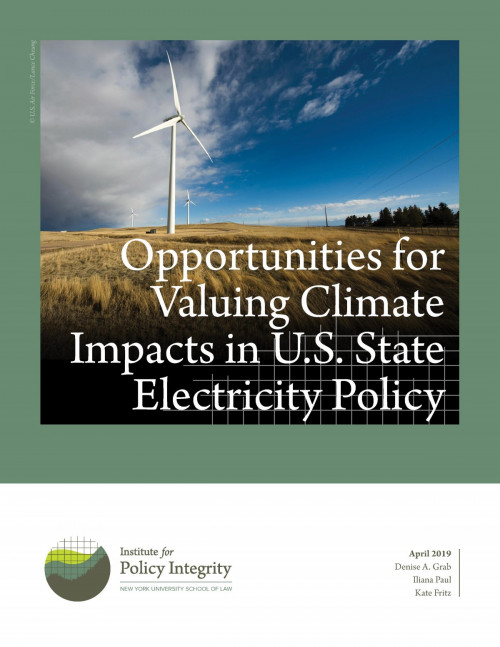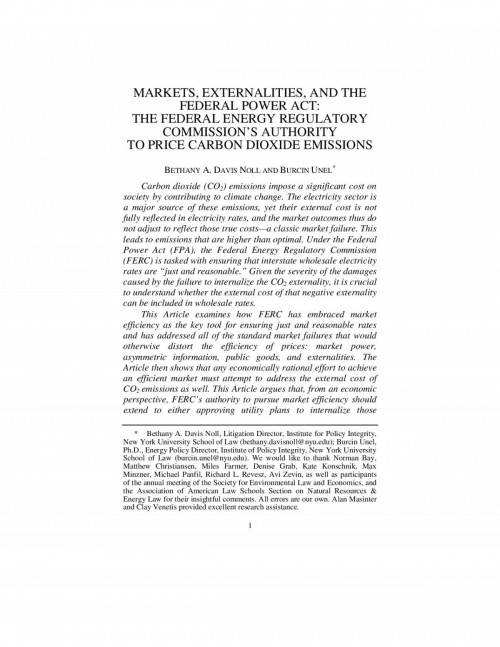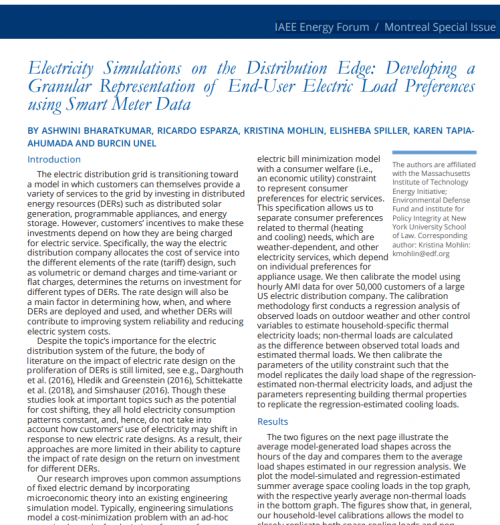-
Electricity Simulations on the Distribution Edge
Developing a Granular Representation of End-User Electric Load Preferences using Smart Meter Data
The electric distribution grid is transitioning toward a model in which customers can themselves provide a variety of services to the grid by investing in distributed energy resources (DERs) such as distributed solar generation, programmable appliances, and energy storage. However, customers’ incentives to make these investments depend on how they are being charged for electric service. Despite the topic’s importance for the electric distribution system of the future, the body of literature on the impact of electric rate design on the proliferation of DERs is still limited. Our research improves upon common assumptions of fixed electric demand by incorporating microeconomic theory into an existing engineering simulation model.
-
Comments to DOE on Energy Conservation Standards for Small Motors
The Department of Energy called for input on developing and analyzing energy conservation standards for small electric motors. We submitted comments encouraging DOE to account for the monetized climate benefits of greenhouse gas emissions using social cost of carbon estimates.
-
Comments to FERC on PJM Reserve Market Reforms
PJM, the regional organization that manages wholesale electricity and the transmission grid in 13 eastern states, recently proposed a number of changes to its operating reserve market in an effort to improve its pricing mechanism. We submitted comments to the Federal Energy Regulatory Commission (FERC) supporting PJM’s proposal and recommending additional changes.
-
Comments on Georgia’s Electric Utility Resource Plan
Georgia Power Company recently published its 2019 electric utility resource plan, which includes projected future costs of different energy generation programs. We submitted comments asking that Georgia Power more clearly quantify and monetize the greenhouse gas emissions of electricity generation alternatives.
-
Comments on California Public Utilities Commission’s New Analysis Framework
We recently encouraged the California Public Utilities Commission (CPUC) to clarify aspects of its new process for evaluating the social costs and benefits of energy resources. As we discussed in prior comments, the proposed analysis framework, the Societal Cost Test (SCT), will help the Commission to make investments that provide the greatest welfare benefits. Our new comments ask CPUC to provide some additional information in the SCT proposal.
-
Comments to DOE on Energy Conservation Standards for Direct Heating Equipment
The Department of Energy (DOE) recently issued a request for information on the energy conservation standards for direct heating equipment. We submitted comments that advise the Department to monetize climate benefits from greenhouse gas emissions reductions and discuss market-based approaches to energy conservation standards.
-

Opportunities for Valuing Climate Impacts in U.S. State Electricity Policy
With an absence of federal leadership on climate change, many states have worked to reduce greenhouse gas emissions on their own, often by incorporating a broader range of considerations into electricity policy. Our report assesses the potential to expand the valuation of climate damages in state electricity policy using Social Cost of Carbon metrics. We examine existing statutes and regulations in all 50 states to identify opportunities for valuing climate impacts around the country.
-
Colorado Senate Testimony on the Social Cost of Carbon
Colorado is considering a major overhaul of its electric resource planning rules and renewable energy standards. Jason Schwartz recently provided testimony in a Senate hearing on the reauthorization of the state’s Public Utilities Commission as part of this overhaul. Schwartz spoke about a possible requirement for the PUC to weigh the social costs of pollution in its decisions. Coloradoans, he explained, are paying the costs of climate pollution in the form of more dangerous wildfires, agricultural damages, declining snowpack, and a range of severe health effects. Many of these important costs can be quantified. In his testimony, Schwartz recommended that the PUC uses Social Cost of Greenhouse Gases metrics when evaluating energy resources in order to improve public welfare.
-

Markets, Externalities, and the Federal Power Act
The Federal Energy Regulatory Commission’s Authority to Price Carbon Dioxide Emissions
This article, published in the New York University Environmental Law Journal, shows how the Federal Energy Regulatory Commission (FERC) must attempt to address the external cost of carbon dioxide (CO2) emissions to achieve an efficient electricity market. CO2 emissions impose a significant cost on society by contributing to climate change. The electricity sector is a major source of these emissions, yet their external cost is not fully reflected in electricity rates, and the market outcomes thus do not adjust to reflect those true costs—a classic market failure. This leads to emissions that are higher than optimal.
-
Comments on New Jersey Rejoining the Regional Greenhouse Gas Initiative
New Jersey is proposing a new state carbon emissions trading program, which means it will rejoin the Regional Greenhouse Gas Initiative (RGGI). RGGI is a cooperative effort among northeastern states to reduce carbon emissions from the electric power sector through allowance trading. New Jersey previously left the initiative in 2011. RGGI expansion promises several benefits, such as improved market efficiency, increased competitiveness, and lower carbon reduction costs. We submitted comments to both RGGI and New Jersey on how to best reintegrate the state.
Viewing recent projects in Electricity



